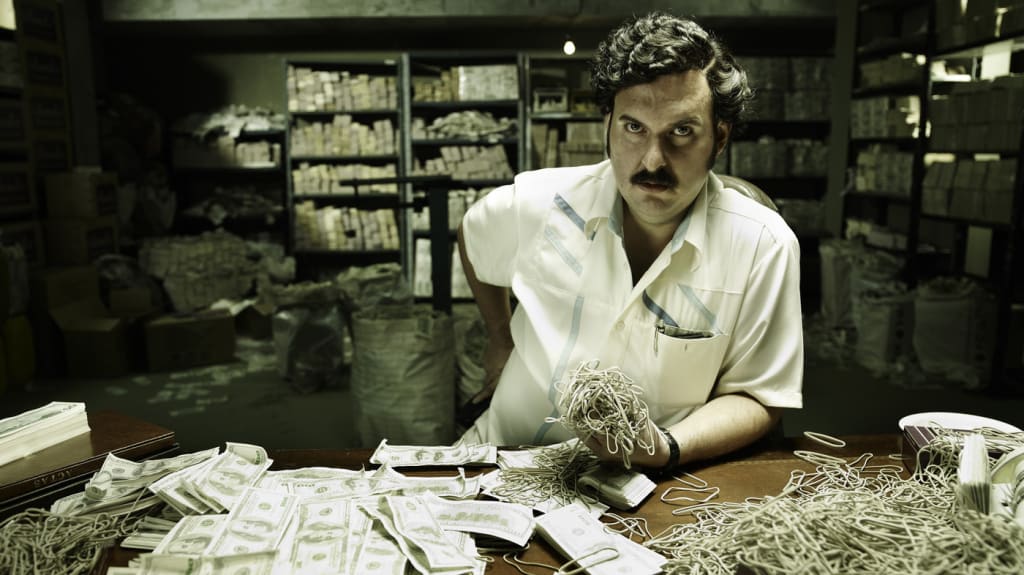Pablo Escobar
Unveiling the Dark Side of a Notorious Drug Lord

In the annals of criminal history, few names elicit as much fascination and dread as that of Pablo Escobar. Born on December 1, 1949, in Rionegro, Colombia, Escobar rose from humble beginnings to become one of the most notorious drug lords the world has ever known. His life was marked by a relentless pursuit of power, wealth, and influence, which ultimately led to his reign of terror and subsequent downfall. While he may have been hailed as a Robin Hood figure by some, his dark legacy is stained with bloodshed, corruption, and cruelty.
Escobar's early life was characterized by poverty and hardship. Growing up in Medellín, he witnessed firsthand the disparities and injustices that plagued Colombian society. Determined to escape the cycle of poverty, Escobar turned to a life of crime at a young age. He began by selling contraband cigarettes, before eventually transitioning into the lucrative world of drug trafficking.
In the 1970s and 1980s, Escobar became the kingpin of the Medellín Cartel, a ruthless criminal organization responsible for trafficking immense quantities of cocaine into the United States and other parts of the world. At the height of his power, Escobar was estimated to be worth billions of dollars, making him one of the wealthiest individuals on the planet. However, his wealth came at a devastating cost.
Escobar's reign of terror was characterized by extreme violence and brutality. He employed a ruthless approach to dealing with anyone who stood in his way, including rival drug traffickers, law enforcement officials, and innocent civilians. The list of atrocities committed by Escobar and his associates is extensive and horrifying.
One of Escobar's most infamous tactics was the widespread use of car bombings as a means of eliminating his enemies. He employed a network of hitmen and sicarios who carried out countless assassinations on his behalf. In one particularly gruesome incident in 1989, Escobar ordered the bombing of Avianca Flight 203, killing all 107 people on board in an attempt to assassinate a presidential candidate who was believed to be on the flight.
But perhaps the most chilling aspect of Escobar's reign was his complete disregard for human life. He orchestrated countless massacres and acts of terrorism in his relentless pursuit of power. Entire communities were terrorized and held hostage by his cartel, with innocent men, women, and children caught in the crossfire.
Escobar's cruelty extended beyond his enemies to those closest to him as well. He was known for his erratic and violent behavior, often subjecting his associates and even his own family members to physical and psychological abuse. His wife, Maria Victoria Henao, endured years of violence and manipulation at his hands, living in constant fear for her life and the lives of their children.
Despite his notoriety, Escobar was able to cultivate a cult-like following among certain segments of Colombian society. He portrayed himself as a modern-day Robin Hood, using his vast wealth to fund social programs and infrastructure projects in impoverished communities. However, these acts of charity were merely a smokescreen for his criminal activities, and many saw through his facade of benevolence.
In the end, Escobar's reign of terror came to a dramatic and violent conclusion. Faced with increasing pressure from Colombian and international law enforcement agencies, he went on the run in 1993 after escaping from a luxurious prison he had built for himself. For months, he evaded capture, but his luck eventually ran out.
On December 2, 1993, Escobar was finally tracked down and killed by Colombian police in a shootout on a rooftop in Medellín. His death marked the end of an era of terror, but his legacy continues to cast a long shadow over Colombia and the world.
Pablo Escobar may have been a mastermind of crime, a cunning strategist who amassed unimaginable wealth and power. However, his story serves as a stark reminder of the devastating consequences of greed, corruption, and unchecked ambition. Behind the glamorous facade of the "King of Cocaine" lies a dark and sinister reality—one of violence, suffering, and tragedy. It is a story that should not be glorified or romanticized but remembered as a cautionary tale of the depths to which human depravity can sink.
About the Creator
Sahil Lathwal
I'm Sahil, a passionate writer. My voice weaves stories, emotions, and melodies into an enchanting tapestry. Welcome to my world of creativity and expression. 🎶📝🎤





Comments
There are no comments for this story
Be the first to respond and start the conversation.